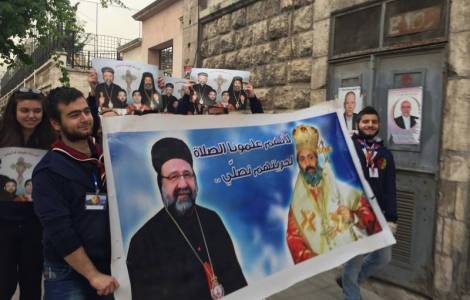
Aleppo (Agenzia Fides) - The Synod of the Greek Orthodox Patriarchate of Antioch, led by Patriarch Yohanna X Yazigi, has appointed Bishop Efrem Maalouli as new metropolitan of the Greek Orthodox archieparchy of Aleppo and Alexandretta. The appointment also acquires importance in light of the fact that the assigned episcopal see had been vacant for more than eight years, following the mysterious disappearance of Boulos Yazigi, the Greek Orthodox Metropolitan of Aleppo who disappeared on April 22, 2013 together with Mar Gregorios Yohanna Ibrahim, Syrian Orthodox metropolitan in the same Syrian metropolis.
The disappearance of the two metropolitans of Aleppo, which took place at the height of the Syrian civil war, represents one of the best known and most controversial facts among the many painful events that have marked in recent years the path of the indigenous ecclesial communities present in Syria since the times of apostolic preaching.
The two metropolitan bishops of Aleppo were kidnapped in the area between the Syrian metropolis and the border with Turkey. The car in which the two bishops were traveling was blocked by the group of kidnappers and the driver - the Latin rite Catholic Fatha 'Allah Kabboud, father of three children - was shot in the head. The kidnapping was not claimed by any group, and since then no details have emerged regarding the reasons for the kidnapping and the fate of the two clergymen. On the other hand, over the years, the misdirection around the case has multiplied and rumors and news announcements have been filtered on several occasions, which later proved to be unfounded.
Already in August 2013, the leaders of the Syrian Orthodox Church had to issue a statement to reject with disdain the insinuations spread by some local media that indicated possible intra-ecclesiastical rivalry and envy among the causes of the kidnapping. Six months after the kidnapping (see Fides, 30/10/2013), General Abbas Ibrahim, head of Lebanese General Security, went so far as to reveal that the place where the two kidnapped Bishops were detained had been identified, and they had started "indirect contacts" with the kidnappers to obtain their release. Revelations which were not followed by concrete evidence.
In January 2020 (see Fides, 15/1/2020), an investigation carried out by an investigative team led by Mansur Salib, a Syrian researcher residing in the USA, and disseminated through the digital platform medium.com, presented a reconstruction of the case. According to the authors of the investigation, the militants of Nour al-Din al-Zenki, an independent group involved in the Syrian conflict, financed and armed during the conflict by both Saudi Arabia and the USA, killed the two and always according to the authors, on April 22, 2013 the two Archbishops had left Aleppo aboard a Toyota pick-up truck, driven by Fatha 'Allah Kabboud, with the intention of going to deal with the release of two priests, Armenian Catholic Michael Kayyal and Greek Orthodox Maher Mahfouz, previously kidnapped by anti-Assad jihadist groups who then controlled the territories east of the Syrian metropolis. Mar Gregorios and Boulos Yazigi, dressed in civilian clothes, fell into what the reconstruction presents as a real trap.
The investigation published on medium.com hinted at the involvement in the kidnapping of characters linked to MIT (Turkish intelligence service). The reconstruction reported information already known, along with allegations exposed without objective findings, including the hint that George Sabra, a Christian leader who has always been close to opposition groups to the government of Damascus, is also involved in the kidnapping of the two Metropolitans. Among other things, the reconstruction claims - by presenting blurred clues or by aggregating information without objective evidence - that the two Archbishops were tortured, and that one of them, in 2015, was in a health facility in Antakya, in the Turkish province of Hatay.
In the final section, the investigation claimed that the two bishops were allegedly killed and buried in an unspecified place in December 2016, while areas east of Aleppo were about to be recaptured by the Syrian army.
Ultimately, not even the investigation published in January 2020 provided certain useful details to clarify the fate of the two kidnapped archbishops. Even the allegations about their death at the hands of the militiamen have never given concrete indications on how and where to eventually find the bodies of the two victims.
During the last eight years, the memory of the story of the two kidnapped bishops has always been kept alive also through processions, prayer vigils, declarations of bishops and public events (see photo). Now, the decision to appoint a new archbishop in Aleppo of the Greek Orthodox Patriarchate of Antioch, led by Patriarch Yohanna X Yazigi, also indicates the desire to move forward, and to heal the wounds that the Syrian conflict has also inflicted on the daily life of ecclesial communities.
The Greek Orthodox archdiocese of Aleppo also exercises its jurisdiction over the Turkish region of Hatay, including the cities of Antakya (ancient Antioch on the Orontes) and Iskenderun (ancient Alexandrette).
Mar Gregorios Yohanna Ibrahim, the metropolitan kidnapped together with Boulos Yazigi in the now distant April 2013, continues to formally lead the Syrian Orthodox archdiocese of Aleppo. (GV) (Agenzia Fides, 14/10/2021)
 ASIA/LEBANON - General Abagnara (UNIFIL): “The Pope’s visit confirms us in our peacekeeping mission”
ASIA/LEBANON - General Abagnara (UNIFIL): “The Pope’s visit confirms us in our peacekeeping mission”
 ASIA/LEBANON - General Abagnara (UNIFIL): “The Pope’s visit confirms us in our peacekeeping mission”
ASIA/LEBANON - General Abagnara (UNIFIL): “The Pope’s visit confirms us in our peacekeeping mission”